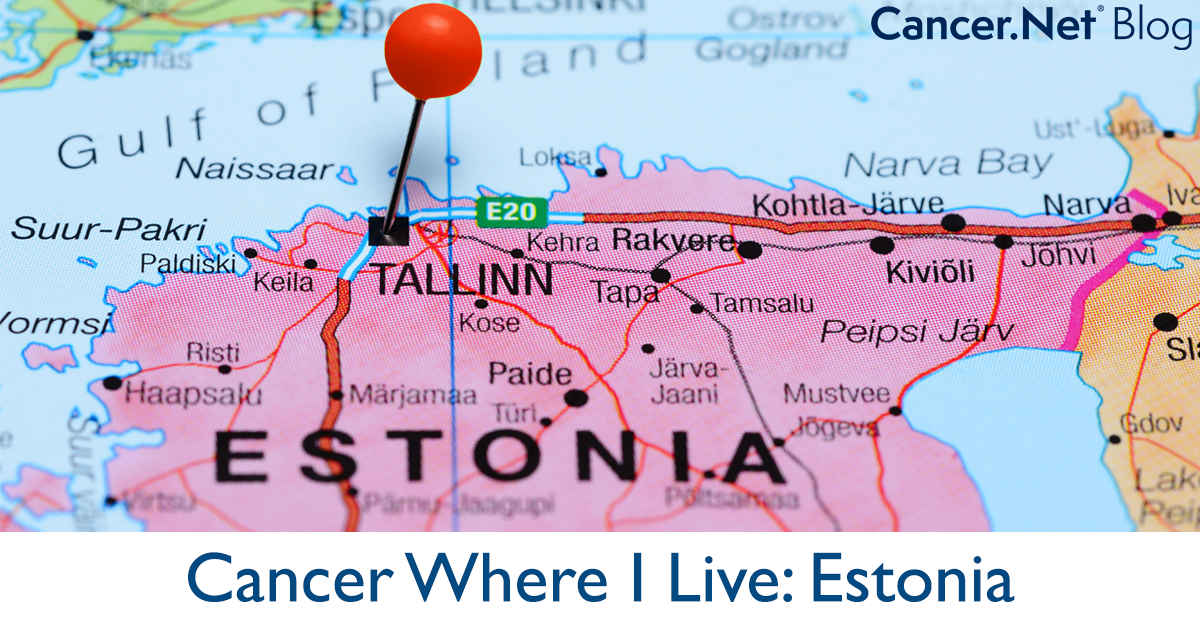
Cancer in My Community is a Cancer.Net Blog series that shows the global impact of cancer and how people work to care for those with cancer in their region. Vahur Valvere, MD, PhD, is the director of research and development in the Clinic of Oncology and Hematology at North Estonia Medical Centre in Tallinn, Estonia. Dr. Valvere is also the president of the Estonian Cancer Society.
Why I care for people with cancer
Very often, interest in a particular profession arises through one’s personal experiences, which was the case for me when choosing the speciality of oncology. My first influencer was definitely my father, who started his career as an oncologist on the island of Saaremaa in Estonia. Later, he became the chief physician of the largest cancer center in Tallinn, Estonia.
In the fourth year of my medical studies at Tartu University, several well-known oncology professors influenced me through their excellent lectures and seminars and, under their guidance, I started my first research project in stomach cancer that same year.
Emotionally, my choice of career has also been influenced by the fact that the incidence of cancer in my family is relatively high. For example, I lost my grandfather to this disease when I was still in secondary school.
What cancer is like in Estonia
Estonia is a small country in the northern part of Europe by the Baltic Sea, with a population of about 1.36 million people. According to the 2020 data of the Estonian Cancer Registry, 8,225 primary cancer cases were diagnosed in Estonia in 2020. Due to the COVID-19 pandemic, there were about 9% fewer cancer cases diagnosed in 2020 than in 2019. In Estonia, about 3,800 people die from cancer each year.
For years, breast cancer has been the most common cancer in women in Estonia, with approximately 850 new cases diagnosed per year. For men, prostate cancer is most common. Approximately 1,100 new cases are diagnosed each year. Lung cancer and colorectal cancer are also both common in Estonia in terms of incidence and mortality rates.
Estonia has a relatively well-developed economy that has gained international recognition due to the rapid development of its digital services. However, we are concerned because compared to the Nordic and Western European countries, cancer is still found more often in locally and regionally advanced stages in Estonia. Therefore, a big challenge for us in Estonia is to work on the relatively low health awareness and relatively low participation in cancer screening programs to diagnose cancers at an early stage that exists in the country. Only about 50% to 60% of people in Estonia participate in these programs. However, we are happy that in recent years, thanks to continuous large national campaigns, we have been able to improve the cancer screening rates in Estonia little by little. For example, using mammography mobile units and buses, the percentage of those who participate in breast cancer screening has already risen to 65% to 70%. The ongoing Estonian National Cancer Control Plan for the years 2021 to 2030 will definitely contribute to this continued improvement.
Currently, we have population-based cancer screening programs for breast cancer, cervical cancer, and colorectal cancer. In southern Estonia, we have a computed tomography (CT) scan-based lung cancer screening pilot project underway, and this year, we plan to start a pilot project for prostate cancer, too. It is also encouraging that we have started to move towards more personalized screening for some types of cancer, such as breast cancer, by taking into account a person’s age, family history of cancer, and their genetic risk of developing certain cancers.
In Estonia, we have a national solidarity health insurance system, which means that all people with cancer living in Estonia who have insurance from the Estonian Health Insurance Fund receive outpatient and hospital cancer treatment free of charge. The state also allows unemployed people to participate in cancer screenings for free, and all treatment costs are paid for if a cancer diagnosis is received. Ukrainian war refugees who have registered in Estonia and have received health insurance can also receive free cancer treatment, just like Estonian patients.
Where patients can find local resources and support in Estonia
In Estonia, patients can find local resources, support, and additional information and assistance from national organizations, such as the Ministry of Social Affairs and the Health Insurance Fund. They can also find resources through the websites of major hospitals providing cancer treatment, such as the North Estonia Medical Centre, Tartu University Hospital, and East Tallinn Central Hospital. There are also non-govermental organizations offering support to people with cancer in Estonia, including the Estonian Cancer Society and the cancer treatment support fund, The Gift of Life, which is funded by private donations.
The author has no relevant relationships to disclose.





